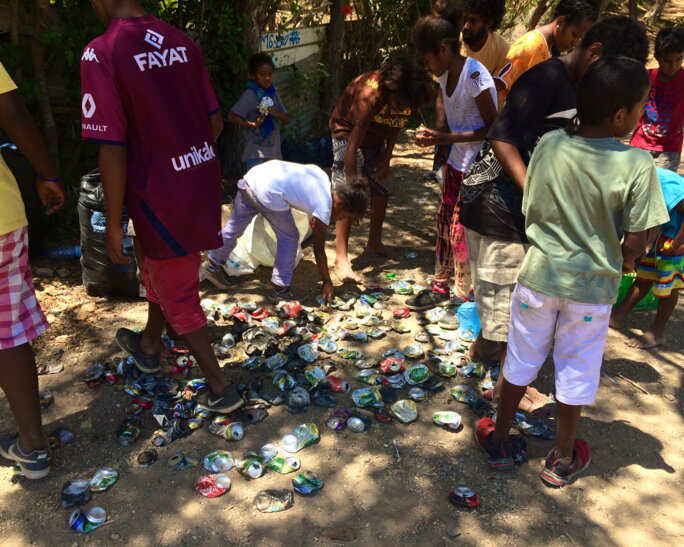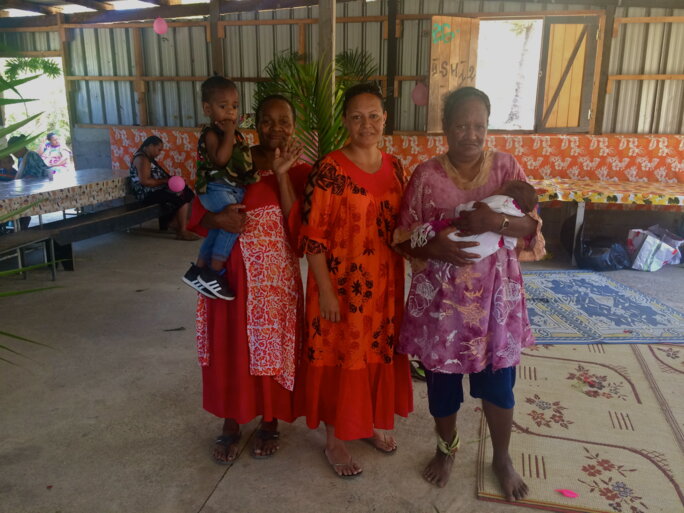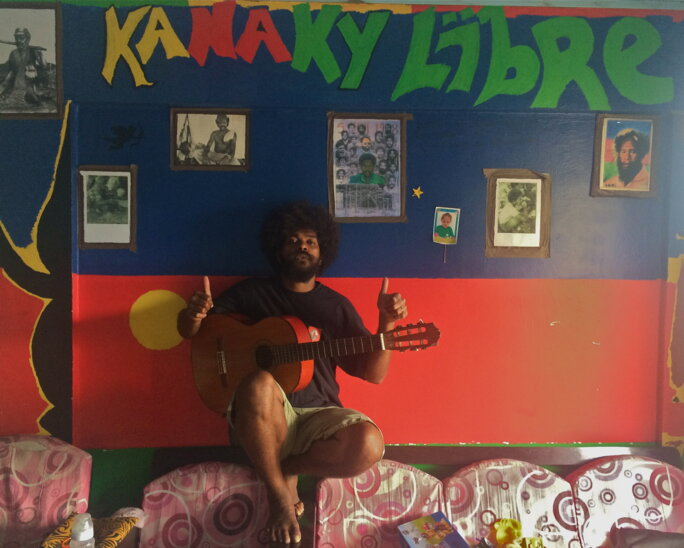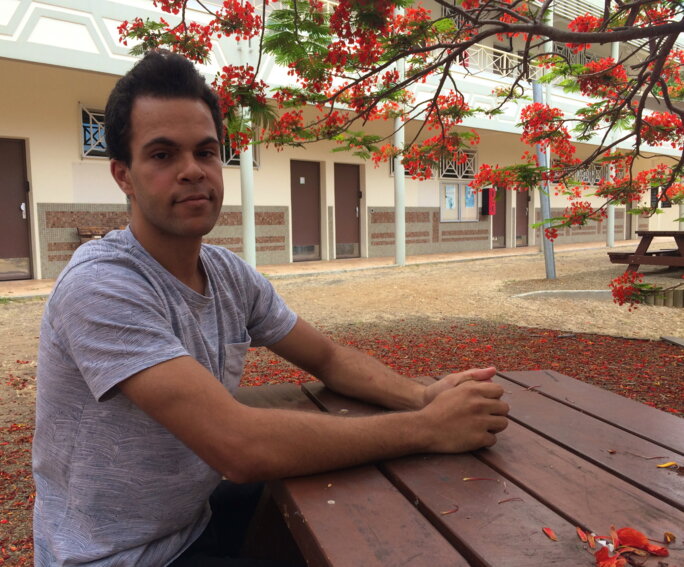Amid the preparations for next year’s referendum on the future of New Caledonia, when the population will decide to either remain a French-run territory or opt for self-rule, political representatives from the Pacific archipelago, situated about 1,200 kilometres east of Australia, met in Paris with French Prime Minister Edouard Philippe on November 2nd to finalise the organization of the vote.
In the document setting out the conclusions of that meeting, it was noted that all the parties agreed that the future of the younger generations should be a key theme, “in order to provide concrete and practical answers to local problems”.
New Caledonia’s young, and notably those from the indigenous Kanak population, are the focus of fears of a possible eruption of violence during and after the referendum, which is to be held by next November at the latest. If the high tensions between the Kanaks and the population of European descent have been lessened since the late 1980s, with the introduction by Paris of measures aimed at easing deep social divides, frustrations and resentment remain potentially explosive just under the surface, to a backdrop of acute unemployment, educational failure and youth crime.
The tinder-box was illustrated in October last year, when rioting erupted after a 23-year-old Kanak was fatally wounded by gendarmes when he attempted to escape a traffic control near the capital Nouméa. In the ensuing violence over the following days, there were shooting attacks against gendarmes, vehicles were burned and hi-jacked, and traffic was paralysed by road blockades. The gendarmerie resorted to using armoured trucks to restore order.
As elsewhere, the younger generations in New Caledonia, which became a French colony in 1853, are a diverse and evolving social group, far from the caricatures that are sometimes projected. Despite an overall ageing of the archipelago’s population since the 1980s, explained by an increasing emigration of young qualified adults and students seeking higher education courses, and also a fall in the birthrate, one in two inhabitants is aged under 31, according to 2014 data compiled by the New Caledonia statistics and economic studies institute ISEE.
After the agreement in Paris in November that finalised the holding of the referendum, Prime Minister Philippe made a four-day visit to New Caledonia at the beginning of December to launch the process. On his arrival, he presented the formation of a group of about 50 young people, who he called “ambassadors”, tasked with promoting the referendum throughout the archipelago and encouraging young people to register on the voting lists. But the challenge for this well-oiled PR operation, figure-headed by French judo champion Teddy Riner, is a vast one given the little enthusiasm for local politics displayed by many of the 18-30 age group.

Enlargement : Illustration 1

Several reports over recent years have raised the alarm over alcohol and drug abuse among the younger Caledonian population, a situation described in one study published by France’s national institute of health and medical research, INSERM, (in French, here) as “a very high level of alcoholization”. The INSERM report found that an estimated 66% of 16- to 25-year-olds of all communities were regular consumers of cannabis. A 2009 study by the Customary Senate (an assembly of representatives from the eight customary areas of the indigenous Kanak population), which focussed on the marginalization of a section of the Kanak youth, spoke of “children who were losing their way” and turning to “alcohol, cannabis, kava [Editor’s note: a traditional relaxant herbal drink], idleness and a behaviour of addiction”.
The Customary Senate study (available in French here) noted: “Violent acts committed by young people, such as robbery with violence unreasoned violence, are almost all carried out under the influence of alcohol and drugs.” Like the INSERM report, the study raised concerns about the significant enduring inequalities in educational performance and access to employment between the Kanaks, the original ethnic population on the archipelago, and the community whose origins are from European, mostly French, settlers.
Among the older Kanaks, many interpret the problems as the result of the difficult reconciliation of traditional ways of life with modern society. “We had everything that was needed inside the tribe, education, preventive actions, self-sufficiency,” argued Maryka Kapoeri, who heads a militant Kanak association called La Ville dans la tribu. “Today, the youngsters in [the capital] Nouméa have no framework. Some of them are in a self-destructive revolt.”
Many observers describe a young generation which is largely disinterested in the issues involved in the 2018 referendum, as underlined by a report published in March this year by a French parliamentary fact-finding commission which noted that, “The young, notably, appear to be unaware of all, or almost, of what is at stake” (available in French, here).
“The young person appears to be ignorant of the beginning of the political and colonial history of their country, with the intrusion of religion, the spoliation of land, the boom in the nickel business and the penetration of globalization,” said the 2009 study by the Customary Senate. “During electoral periods, however, solicited by many parties, [the young] have the feeling of being used, but also soon forgotten.”
Earlier this month, Mediapart met with diverse members of the younger generation and those who work closely with them, to ask them about what they see as being the stakes of the referendum on auto-determination, and how they envisage the future of the archipelago.
- Nouméa, inside a squat called ‘Tina’
About 140 families live in a squat, called Tina, situated about ten minutes from the heart of the capital Nouméa. Most of them live on an income of less than the French minimum legal wage (which in 2017 was a monthly 1,480 euros).
There was an effervescent atmosphere when Mediapart visited the site one morning this month. Mothers in the communal house were preparing Christmas for their children, the youngest of whom were excitedly running around everywhere. A few metres away, older children were stamping on empty drinks cans which had been collected in a pile on the ground. “It’s an activity suggested by god’s representative who’s over there, with his family,” said, pointing with his finger, one male inhabitant of the squat, who is originally from Ouvéa, one of the archipelago’s islands where, in 1988, militants of the Kanak and Socialist Liberation Front took 31 gendarmes hostage in a cave, demanding talks with French government over independence for New Caledonia. The notorious siege ended with the deaths of six gendarmes and 19 Kanak rebels.

Enlargement : Illustration 2

“God’s representative” is Charles Nemia, who presents himself as a “pastor” and who calls for a return to “Hebrew roots”. He integrated the squat in 2004, having previously worked for much of his life as a supervisor in a local nickel mine. “It’s not very long since we’ve had running water,” he said, adding that despite the sparse living conditions the squat’s inhabitants prefer to remain rather than be housed in concrete buildings. “Here, when they can’t pay for gas [bottles], they only have to light a fire,” he explained.
That morning, in the pre-Christmas celebrations for the children, Nemia had organised the collection of the drinks cans, promising a present for the child who would collect the most. “It’s a way of making them aware of environmental problems,” he said. “And also, while they take part in activities, they don’t smoke.

Enlargement : Illustration 3

Nemia is concerned about the problem of very young children smoking cannabis, which he says often begins from the age of 13. “They drink, too,” he said, indicating empty cans on the ground, most of them beer brands. He said he engages in activities with the older children on a daily basis. “For the past year and a half, I take those without work to the government to help them integrate into society,” he explained, referring to the offices of the local High Commission. “Some don’t have a diploma, others are registered nowhere,” he adds. “No-one looks after them, their situation is not a priority for politicians. […] Most of the youngsters who live in the squat remain there. In any case, where would they go?”

Enlargement : Illustration 4

Listening to Nemia, it seems that the referendum in 2018 is almost a non-subject. “None of the youngsters who I know talk to me about the referendum,” he said. “Independence or not, what will that change for them? They must first be given the possibility of training and to obtain a job.”
- Darewa Dianou, vice-president of the “Kanaky Truth Justice Committee” (Comité Vérité Justice de Kanaky)
Darewa Dianou expresses his anger calmly. He lives in an apartment in the working-class Nouméa neighbourhood of Tindu, which is mostly inhabited by Kanaks and descendents of immigrants from the Polynesian Wallis and Fortuna islands who make up the third-largest ethnic group in New Caledonia, after the Kanaks and Europeans. Sitting on his small balcony with his friend Husa Angexetin, he wants to talk about a lot of things, but not very much about the referendum which he calls “rubbish”.

Enlargement : Illustration 5

“Our lives won’t stop in 2018,” he commented, his friend nodding silently in agreement. Inside the apartment a dish of fish is heating on the cooker, while the television blurts out running commentary on the death of French rocker Johnny Hallyday, which no-one is following. Dianou’s children are playing in the living room whose four walls are covered with drawings; among them is the Moor’s Head, the symbol of the French Mediterranean island of Corsica, the face of Che Guevara, and notably the portraits of the 19 Kanaka independence militants who died during the hostage taking in Ouvéa on May 5th 1988. Among them is Dianou’s father, Alphonse Dianou, who was presented as the leader of the group.
Alphonse Dianou is present all around the apartment, 30 years after his death, and his words and beliefs survive through his son. “My father didn’t talk about a ‘common destiny’,” said Darewa Dianou, referring to the preamble of the Nouméa Agreement (L’accord de Nouméa) of 1998, when the French government gave back certain political power to the population of New Caledonia and which allowed for the holding of next year’s referendum. “He spoke of resurrection,” continued Dianou, “meaning something that existed and which must be reborn.” In this, he identifies a nation, Kanaky – the name for the archipelago used by the independence movement – and a “way of being”, and for him, no referendum decided in Paris can dictate the future of that.
“Today, it is the state which decides what is done, but who do they take themselves for?” he asked. “They killed my father and, afterwards, they come and tell us that they will de-colonise us? We’ve never expected anything from the [French] republic.” Suddenly getting up, he went to fetch his voting card, which he brought back and set alight, reducing it to ashes. “Apparently Macron wants to change everything? He has to be told that the ‘sixth republic” is the Republic of Kanaky. In any case, the people don’t want to vote.” In the French presidential elections earlier this year, the abstention rate was around 50%, far higher than in mainland France.

Enlargement : Illustration 6

Dianou places no faith in any existing political figure, including what he calls the “oldies” who make up the Customary Senate, and who he said “laid out a carpet of flowers” for French Prime Minister Edouard Philippe during his four-day visit to the archipelago earlier this month. “They follow the customary path to calm things down. They are all trying to find a way out, but they’re walking in circles.”
He is scathing of the “Matignon Agreements” concluded in Paris in June 1988, less than two months after the hostage taking in Ouvéa, which were the first to give economic and institutional rights to the Kanak population in an effort to defuse the high tensions between the pro- and anti-independence parties, and which paved the way for the 1998 Nouméa Agreement. “The Matignon Agreements were a betrayal,” said Dianou. “If it begins by betrayal, all the rest is nothing but betrayal. The victims of history are us.” He is mocking of the development projects funded by the French state over the past 30 years. “There’s talk of restoring the balance, but there’s not even a social balance here. What do you want to re-balance? Our elders farmed fields of pineapple. Today, the young are shown how to grow fields of social benefits. We are tired of eating dirty money.”
Dianou does not believe that the land of Kanaky is a utopia, and the issue of its economic independence is not in question. He cites the example of the South Pacific island nation of Vanuatu, which gained independence from its French and British rulers (a joint rule of the archipelago known as The New Hebrides Condominium) in 1980. “Over there, they’re not going to go on a march to ask for a road,” he joked. “They try to valorise their traditions as much as possible. It is happiest country in the world.” Dianou has hopes of taking a delegation of young Kanaks on a visit to Vanuatu “so that they realize what independence is”.
He finds that those youngsters that he regularly meets show little or no interest in the subject. He claimed that if they steal a car “it’s not delinquency, it’s revolt”. He wants to “canalize the energy of the young differently” by helping them find work and explaining that “cannabis can serve other purposes than just smoking”.
Dianou’s friend Husa spoke up. “The others prostituted customs,” he said. “That’s why we work on spiritual things.” The pair do not believe the there is a risk of violence over the referendum, which a number of politicians and observers have warned of. “They cultivate fear,” said Dianou. “There’s a wolf – we’re not going to throw ourselves into its jaws. If our dads fought with arms, we fight with words. It’s a big project, but we know we’re going to get there. We have time on our side. The system might have the wristwatch, but we have the time.”
- Yoan Tavouvas, a law student at the University of New Caledonia
At the University of New Caledonia, situated on the Nouville peninsula, the corridors are already empty ahead of the official start to the Christmas and New Year holidays. Some of the students are fine-tuning their dissertations, others have left for their family homes in the archipelago’s north, and others still have begun travels to mainland France. Yoan Tavouvas is one of the students who is still on the campus, and he took time out from his law studies to talk to Mediapart, seated under one of the giant Royal Poinciana trees in the university gardens.
Tavouvas, 23, is studying for a master II postgraduate degree. The day before he had attended a meeting with French justice minister Nicole Belloubet who was in New Caledonia as part of the delegation accompanying Prime Minister Philippe. He appeared to have been largely unimpressed by the event, although the referendum next year interests him a great deal. “It’s a pivotal year for New Caledonia,” he said of 2018. “The stakes are important for the economic and political development of the territory.”

Enlargement : Illustration 7

Tavouvas has been active with an association set up in 2009 by history and geography students called Découvre ton caillou (DTC), meaning ‘Discover your stone’, the colloquial name given to New Caledonia. As part of the association’s activities, he has organised evening meetings that he says are designed “to vulgarise political speech” and “to spell out the fundamentals, the key words of the referendum”.
According to Tavouvas, and in contrast to the previous interviewees, local young folk do feel quite involved with the referendum, although he has difficulty in identifying an emerging majority choice among them. “There are very loyalist students, and others who are very independentist,” he said. “Each has their vision, but in discussions they always finish by converging towards a certain number of points of agreement.” He says he wants to wait a bit more before announcing his choice, although his mind is almost made up. “When we discuss, you understand that at the current time we’re not capable of being independent.”
The young man’s racial origins are mixed, with Kanak, Vietnamese and European family. He is one the Yambé tribe from Pouébo, a municipality some 450 kilometres away from Nouméa, situated on the north-east of New Caledonia’s main island Grande Terre. Tavouvas said that in Pouébo “people urge the young to leave the tribe to find work”, which is why he left several years ago to study in Nouméa. “But everyone travels up back to the bush at the weekend to see and help their parents,” he added, referring to the countryside as bush. “In the bush, the young folk are calmer than here, they work. In town, they hang around at night, they’re left to their own devices, they have no social framework. These are two very different ways of life.”
During his visit to New Caledonia this month, French Prime Minister Edouard Philippe laid the first stone of the future site of an annex of the University of New Caledonia in the north of Grande Terre, situated in Koné, about 265 kilometres from the university’s base in Nouméa. The geographical extension of the university to the less developed northern parts of the island is historically part of the social “rééquilibrage”, or ‘restoring of balance’, in society in New Caledonia that was promised as far back as the 1988 Matignon Agreements.

Enlargement : Illustration 8

The new buildings are due to be ready in 2020, but some of its activities will begin next year. Tavouvas recognizes that the path to restoring a proper balance between the Kanak population and that of European origin has a long way to go still. But he believes that much has changed over the past 30 years, and says that the term “decolonisation”, which is used in United Nations texts on the subject of change in New Caledonia, is no longer applicable to the situation today.
“When the French arrived, it was colonization,” he said, but that today, “There is no longer the indigénat code”, referring to the special administrative system France applied up until the end of World War II to indigenous populations in its colonies. “For me, it’s an evolving country, a laboratory. There are experiences to be had, things to be tested. But that being the case, I don’t really recognise that in political speech.” While he thinks local politicians are “close to the people”, he would like to see the population “express itself more”.
He hopes that the campaign to explain what is at stake in the referendum will put an end to some of the rumours that currently circulate in the university, such as that if the vote produces independence, non-Kanaks will be expelled from the archipelago. Even if that is a fantasy, it is one, among others, that threatens to exacerbate tensions around the vote. But Tavouvas is confident that the referendum, and its aftermath, will be largely orderly. “Conflicts are sparked everywhere, here like elsewhere,” he said. “It won’t be like a world of cuddly Care Bears in 2018, but neither should one exaggerate.”
-------------------------
- The French version of this report can be found here.
English version by Graham Tearse


